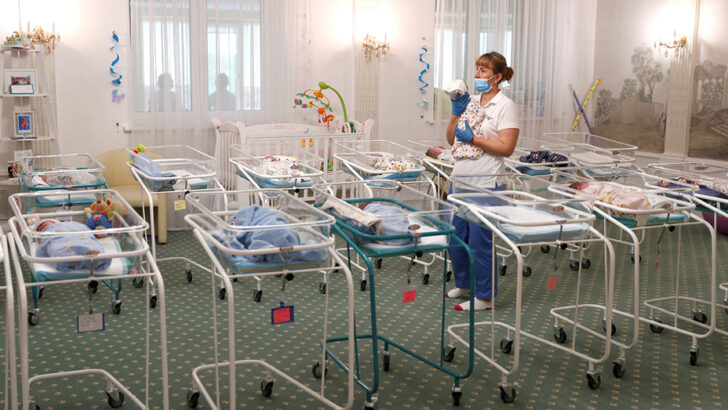Surrogacy in Ireland was legalised in June with virtually no critical media scrutiny. Even when the Irish Human Rights and Equality Commission’s (IHREC) Third Annual Report on Human Trafficking strongly criticised part of the legislation, serious and concerning issues remain quietly buried.
IHREC Commissioner, Ms Noeline Blackwell, explained on a recent Morning Ireland programme that the EU Anti-Trafficking Directive has been extended to cover those trafficked into the EU for purposes of surrogacy.
The IHREC Report is gravely concerned that no account has been taken of Irish obligations to uphold the amended EU Anti-Trafficking Directive about international surrogacy. IHREC wrote twice to the Minister for Health without a reply.
The IHREC also states: ‘We remain concerned that the insertion of Part 8 – International Surrogacy – [in the Assisted Human Reproduction legislation] would extend the legislation to a practice [surrogacy] not permitted by any other EU State, in an area marred with increasing human trafficking.’ The Commission is concerned that this new law ‘may thwart other countries’ efforts to protect their citizens from trafficking and reproductive exploitation.’
Trafficking
Trafficking for purposes of surrogacy is already happening. In August last year, eight staff members of the Mediterranean Fertility Clinic in Crete were arrested.
According to the Progress Educational Trust, the clinic staff ‘are facing charges including human trafficking, violations of assisted reproduction legislation, forgery, falsification of medical data, and fraud.’
Over 160 women from countries like Georgia and Albania were allegedly forced to be egg donors and surrogates and were housed together in prison-like conditions. Intending parents were charged over €100,000 and the surrogate mothers were only given a pittance.
The new Irish Assisted Human Reproduction legislation was originally meant to cover only domestic surrogacy and to confine it to altruistic surrogacy. An entirely new section was tacked on, Part 8, to deal with international surrogacy mere months before the Bill was passed.
It is extraordinary that Ireland would take the unprecedented step of not only permitting domestic surrogacy but authorising international surrogacies as well”
This Irish Assisted Human Reproduction legislation includes forming a new body, the Assisted Human Reproduction Regulatory Authority (AHRRA) which will be responsible for implementing and monitoring the new law. So now, the AHRRA will also be responsible for pre-authorising international surrogacy arrangements outside Ireland as well. In other words, people will apply to an Irish body for the right to use surrogates in other countries.
It is extraordinary that Ireland would take the unprecedented step of not only permitting domestic surrogacy but authorising international surrogacies as well. As the IHREC report states: ‘It is apparent from the Joint Committee and Committee Stage debates in the Dáil that there is a clear understanding that Irish law is not capable of regulating what occurs in other countries.’
However, even altruistic surrogacy is controversial because the Act provides for ‘reasonable expenses’ which in other jurisdictions, amount to attractive sums for poor women.
For example, Greece, which theoretically only allows altruistic surrogacy has a limit of €10,000, which is not a small sum for a poor woman, but this limit is routinely flouted and ‘reasonable expenses’ for altruistic surrogates are often double that amount.
This profound concern, much less concern about authorising international surrogacy, has not even been addressed in most Irish media, which concentrate mainly on publishing stories of happy families created through surrogacy. Yet international surrogacy has been rife with exploitation.
For example, in 2020, the Princeton Journal of Public and International Affairs reported surrogates in Ukraine were experiencing ‘forced abortion, authoritarian and abusive living conditions in required surrogate housing, a lack of adequate medical care, and no reparations for long-term health issues due to surrogacy’. Similar abuses in India and Nepal led to bans on commercial surrogacy there.
Abandoned
Baby Gammy in Thailand was initially abandoned because of Down Syndrome. In another case, one young, single, male, Japanese billionaire commissioned 13 babies in just a year in Thailand. After several years, he was granted custody of them all.
In adoption, there is an international agreement called the Hague Convention, regulating and monitoring inter-country adoption.
Surrogacy advocates often resent comparisons with adoption, stating that biological parenthood among the fertile is not subjected to the same controls, so it amounts to discrimination to scrutinise infertile parents forced to use surrogacy.
But biological parenthood does not involve numerous outside parties, including States, and a multi-million euro fertility industry. It is absolutely reasonable to subject this process to scrutiny.
However, unlike adoption, no international agreement exists regarding surrogacy. It is unlikely to exist given that most countries, including the UK, Canada, New Zealand, Australia, and Brazil prohibit commercial surrogacy, and other countries, including France, Germany, Italy, and Spain prohibit both commercial and altruistic surrogacy.
Astonishingly, Ireland has enshrined in law that it will give a stamp of approval to international surrogacy arrangements in places where we have no way of knowing whether mothers or babies will be treated as anything except commodities. Yet there is no outcry. Why?


 Breda O'Brien
Breda O'Brien A nurse and newborns are seen in the Hotel Venice in Kyiv, Ukraine, May 14, 2020, which is owned by BioTexCom, a surrogacy agency. Surrogacy is among more than a dozen issues covered by a new Vatican document on human dignity. Photo: OSV News/Gleb Garanich, Reuters
A nurse and newborns are seen in the Hotel Venice in Kyiv, Ukraine, May 14, 2020, which is owned by BioTexCom, a surrogacy agency. Surrogacy is among more than a dozen issues covered by a new Vatican document on human dignity. Photo: OSV News/Gleb Garanich, Reuters 